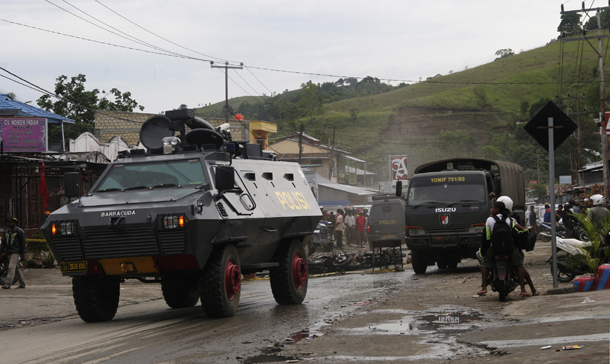JAKARTA — Dozens of political prisoners convicted of treason in Indonesia’s easternmost Papua province say they’ll reject a proposed plan to be freed under a government amnesty program, arguing that leaving jail would amount to admitting guilt for crimes they didn’t commit.
Twenty-six Papuan political prisoners currently jailed at Abepura prison near Jayapura, Papua’s capital, signed a letter last week refusing to accept the amnesty if it’s offered. The plan was proposed in late April by the governor, local lawmakers and other organizations in the province to Indonesian President Susilo Bambang Yudhoyono, Papua Consultative Assembly chairman Timothius Murib said Monday. However, the amnesty has so far not been offered.
The proposal was part of “special autonomy plus” conditions put forward for the restive provinces of Papua and West Papua to mark the 50th anniversary of the integration of Papua into Indonesia this year.
The prisoners’ letter was sent to Yudhoyono’s office Friday and copied to several foreign diplomats in Jakarta, said Agus Kosay, a pro-independence activist.
“They believe what they are fighting for is the truth,” he said. “If they accept the clemency, it means they admit that they are guilty.”
Filep Karma, 54, a prominent political prisoner who has served eight years of a 15-year treason sentence for raising the Morning Star flag, a symbol of the banned Free Papua Movement, was among the convicts who signed the letter.
Karma himself has rejected the government’s annual program to reduce his jail term several times.
In a copy of the letter sent by email to the media, the prisoners explained that they have been jailed for defending Papua’s dignity, and said they plan to continue their struggle to save it from discrimination, marginalization and ethnic extinction.
“We reject the government of Indonesia’s plan to give us clemency,” the letter said. “We don’t need to be freed from jail, but we need and demand the freedom of Papua from Indonesian annexation.”
Indonesia is highly sensitive to the separatist struggles in Papua, a former Dutch colony taken over in May 1, 1963. The government restricts visits by human rights workers and journalists, and pro-independence activists have been given lengthy prison terms for peacefully expressing their views, organizing rallies or for simply raising separatist flags.
Justice and Human Rights Ministry spokesman Goncang Raharjo said Monday that he had not heard of any plan to grant amnesty to the political prisoners.
“Amnesty is the full right of the president, but it should go through a long process,” Raharjo said, adding that it involves input from the Supreme Court and the parliament.
However, after meeting with Yudhoyono in Jakarta, the capital, the president indicated he was open to the idea, Murib said.
In 2010, two political prisoners were freed after Yudhoyono granted them clemency. They were jailed for raising the banned flag and involvement in a violent pro-independence rally.
Though Indonesia’s sovereignty over Papua was formalized in 1969 through a stage-managed vote, a small, poorly armed separatist movement has battled for independence ever since.

















